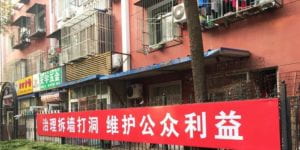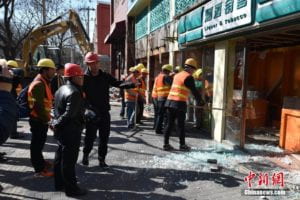There used to be a widespread phenomenon in Beijing called Kai Qiang Da Dong (开墙打洞), which would be “hole through the wall” if translated directly into English. The so-called Kai Qiang Da Dong means that the residents on the first floor of the residential building pierced through the original window’s bottom edge to turn the window into a doorway and let the doorway face the road. In this way, the original residential room could be used for commercial purposes. The housing could be changed into stores, barbershops, small restaurants, etc. Some people run the store by themselves, and some rent the space to others. There are many benefits to opening stores in a residential building. One of the most important advantages is that the source of the customer is guaranteed. Such commercial space usually provides day daily service to nearby neighborhoods, and the shop manager is always seen as an acquaintance of the customer instead of a merchant. Kai Qiang Da Dong is illegal by law because, as the window becomes a doorway, the room above’s support is weakened, creating a risk that may endanger the upper floors. However, the commercial space creates through Kai Qiang Da Dong undeniably provides much convenience to the neighborhood and offers jobs to low-class people living in urban cities.
The phenomenon of Kai Qiang Da Dong has appeared as far back as the 1990s but was largely ignored and acquiesced by the government until 2017. In 2017, the mayor of Beijing Cai Qi enacted policies to combat the behavior of Kai Qiang Da Dong. The government not only banned any further Kai Qiang Da Dong in Beijing but also torn down those restaurants and shops that were previously created by Kai Qiang Da Dong and restored the wall. According to Sohu’s news release, tens of thousands of shops and restaurants were forced to close down because of this government action. Such action was aimed to clean up the city but caused discontent among Beijing residents. Many restaurants that run for decades and enjoyed great reputations among their loyal customers had to change their addresses. It was especially an annoying shift for older people who were not familiar with internet technology and more used to local shops and restaurants. The torn down of those shops and restaurants is also the deprivation of their living space in the city.

(Banners with slogans of against Kai Qiang Da Dong put on the street by the government)
People who were affected even more badly than older people are those low-class workers in Beijing. Many of them didn’t own a Beijing Hu Kou and came to Beijing to find jobs. The torn down of the spaces created by Kai Qiang Da Dong is literally the destruction of their living basis. The shops and restaurants created by Kai Qiang Da Dong are usually small and run by families who work and live there at the same time. After no longer being able to run business in Beijing, many low-class families couldn’t afford to pay the rent and moved out of Beijing. Thus the combat against Kai Qiang Da Dong is also the action of dispelling low-class people in Beijing and blocking social mobility.

(Construction team demolishing stores created by Kai Qiang Da Dong)
In my own opinion, the combat against Kai Qiang Da Dong is the claim of power of the government authority. It indeed entails some good intentions of creating a more neat and clean city space. However, it violates the most basic responsibility that a city (especially a capital city) should take, which is enabling every resident to earn a living in the city. In this sense, the Beijing government’s action reflects the capital city as a place where the state apparatus exerts its power instead of a public space owned by the people.
Here is a video of a girl’s tour to the previous Kai Qiang Da Dong restaurant and her interview with the restaurant owner.
Leave a Reply